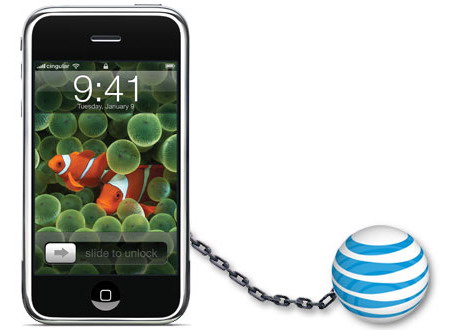Wired on the iPhone network meltdown (Updated)


The article is filled with insights on how AT&T failed so spectacularly after the launch of the iPhone. Not surprisingly, it was largely due to the unfettered Internet access granted to millions of iPhone users who consumed bandwidth with reckless abandon. But to hear AT&T tell it, it's just as much Apple's fault.
Wired compared it to a loveless celebrity marriage, but it's more of a tragic love story. Apple and AT&T fell in love and quickly got hitched. Then after the honeymoon was over they started noticing each other's faults. Apple was staunch and unwilling to restrict the iPhone's Internet access, AT&T couldn't build its network out fast enough to accomodate them. Then came the finger pointing. But the two couldn't divorce, for the the sake of the kids. So they ended up tolerating each other, for the time being.
It's filled with fun anecdotes too, like early on when an AT&T representative suggested to one of Jobs' deputies that the Apple CEO wear a suit to meet with the AT&T board, he was told "We're Apple. We don't wear suits. We don't even own suits."
One of the iPhone's problems was that Apple had chosen to source the radio from Infineon, whose hardware was used widely in Europe but rarely in the US, where cell towers are placed farther apart and reception was therefore less forgiving. AT&T would say "Let's resolve these issues together" and Apple would say "No, you resolve them. They're not our problem. They're your problem."
One Apple source told Wired that Jobs has discussed dropping AT&T at least a half a dozen times. Despite the problems, the iPhone's meteoric rise to stardom has helped both companies. It represents over $13B in annual revenue for Apple, the company's profit has doubled since 2007 and its stock price has nearly tripled since the end of 2006. Since early 2007 AT&T's wireless revenue is up 43 percent, profit is up roughly 200 percent and subscribers have grown 40 percent.
On the two-year tethering impasse: Apple wanted it included in the data plan, AT&T wanted to charge extra.
Apple also heavily considered switching to Verizon numerous times. Around the end of 2007, at Jobs' behest, Apple engineers (including Scott Forstall) visited the headquarters of Qualcomm - the primary supplier of the chips in Verizon's phones. It concluded that switching to Verizon would be too complicated and expensive because the chips were different sizes and would necessitate rebuilding the iPhone from scratch. Apple also wasn't convinced that Verizon's network would fare much better and let's not forget the nasty lawsuit that voiding its exclusive pact with AT&T would invite.
But there's hope yet. According to the article Qualcomm began working with Apple on a chip that could allow the iPhone to work on both the AT&T and Verizon networks. WSJ has reported that a Verizon iPhone could debut in the fall, while Bloomberg says that it'll happen in January 2011. For many a Verizon iPhone can't come soon enough.
Why can't Apple release the iPhone to all mobile carriers? Wouldn't that help it achieve the global dominance it desires?
When iPhone eventually jumps carriers, will you switch from AT&T? Will the Verizon network fare any better?
Photo: jjhelp
Updated: Wired has posted the article online.